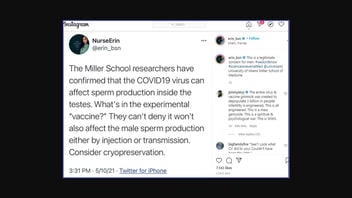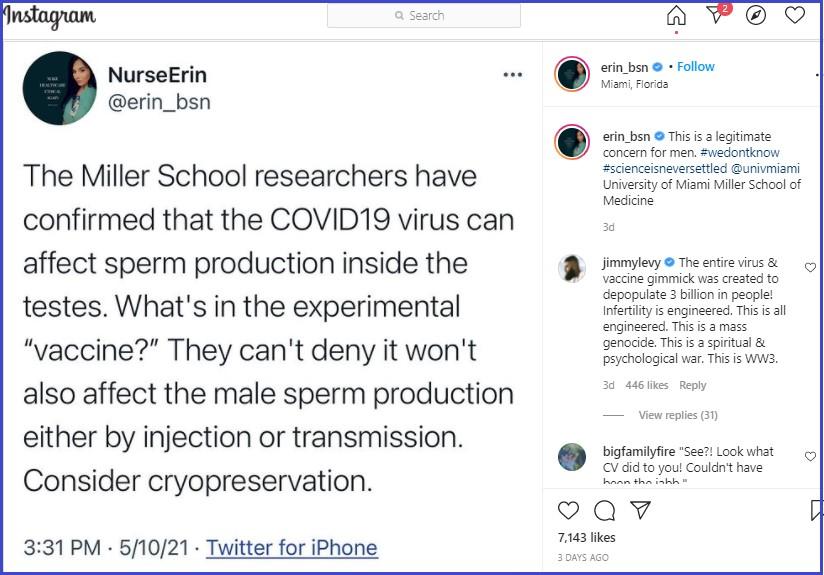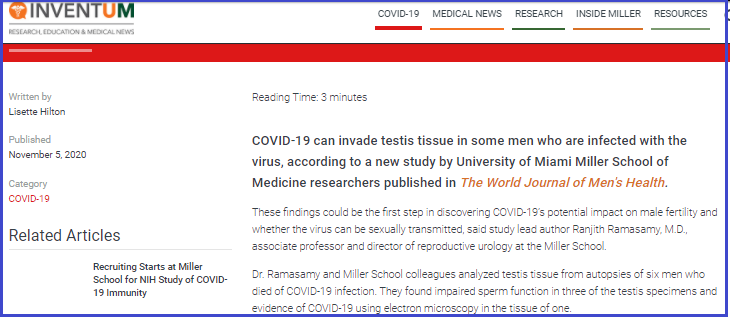
Does a University of Miami study confirm that COVID-19 vaccines will affect men's production of sperm? No, that's not true: The Miami study looked at sperm counts of men infected and killed by COVID, not those of vaccinated men.
The Instagram post also claims vaccines can suppress sperm counts "either by injection or transmission," an illogical expansion of the study's findings. COVID vaccines take a new approach. Unlike past vaccines, they don't train human immune systems by provoking a mild infection with weakened or dead novel coronavirus. Instead, the new mRNA approach presents to the body only the spike protein part of the virus, which trains the immune system to swarm if a person is infected with spike-bearing novel coronavirus.
The claim appears in a May 10, 2021, Instagram post (archived here) that opens: "The Miller School researchers have confirmed that the COVID19 virus can affect sperm production inside the testes." It continued:
They can't deny it won't also affect the male sperm production either by injection or transmission.
Users on social media saw this on May 14, 2021:
(Source: Instagram screenshot taken Fri May 14 at 10:30:37 UTC 2021)
The post's characterization of the vaccine as "experimental" could mislead readers about the nature of science and of the vaccine regulatory process. The COVID-19 vaccines are approved, tested medical injections that passed safety testing on tens of thousands of people before getting expedited approval in the face of a fast-spreading pandemic that had killed more than 581,000 Americans as of the day this fact check was written.
The vaccines are only experimental in the sense that safety data is continually collected on most drugs and vaccines and best medical practices are subject to changes as evidence accumulates over time. Here's the FDA's detailed description of the emergency process used to select the most promising COVID-19 vaccines and test them to determine that theie documented preventive effects outweigh documented risks.
The main flaw in the claim is that the 2020 paper, "Histopathology and Ultrastructural Findings of Fatal COVID-19 Infections on Testis" is based on a small sample, and the authors make no claim as bold as the Instagram post's. Autopsy tissue samples were taken from the testicles of six men who died of SARS-CoV-2 and of three who did not die of or with it. Some evidence of infection was found, as was evidence of effects on sperm production. The authors wrote:
This study suggests the male reproductive tract, specifically the testes, may be targets of COVID-19 infection. We found an inverse association between ACE-2 receptor levels and spermatogenesis, suggesting a possible mechanism of how COVID-19 can cause infertility.
The authors' qualification of their findings -- with words like "suggests" and "possible mechanism" -- does not support the Instagram claim's declaration that researchers have "confirmed" anything about COVID-19 and sterility.
A University of Miami news release about their faculty's study did not declare "confirmation" of the hypothesis, either, highlighting instead the news that researchers could be onto something for further study. What follows is a screenshot of an archived version of the InventUM article.
(Source: Inventum screenshot taken Fri May 14 at 23:43:53 UTC 2021)
It is common for published research to serve as the indicator for further research. In this case, a small study is likely to lead to a more comprehensive study with a bigger cohort of patients and numerous "control" patients who have not had COVID-19, but have died or suffered from other viral infections that may affect sperm production.
A 2013 paper in the Journal of Reproductive Immunology, for instance, collected a variety of findings that men are at risk for infertility after infection with human papilloma, herpes, human immunodeficiency, cytomegalo and adeno viruses.
Lead Stories emailed and called the corresponding author, Dr. Ranjith Ramasamy of the University of Miami Miller School of Medicine, for further context on May 14, 2121, and will update this fact check if he responds.



















